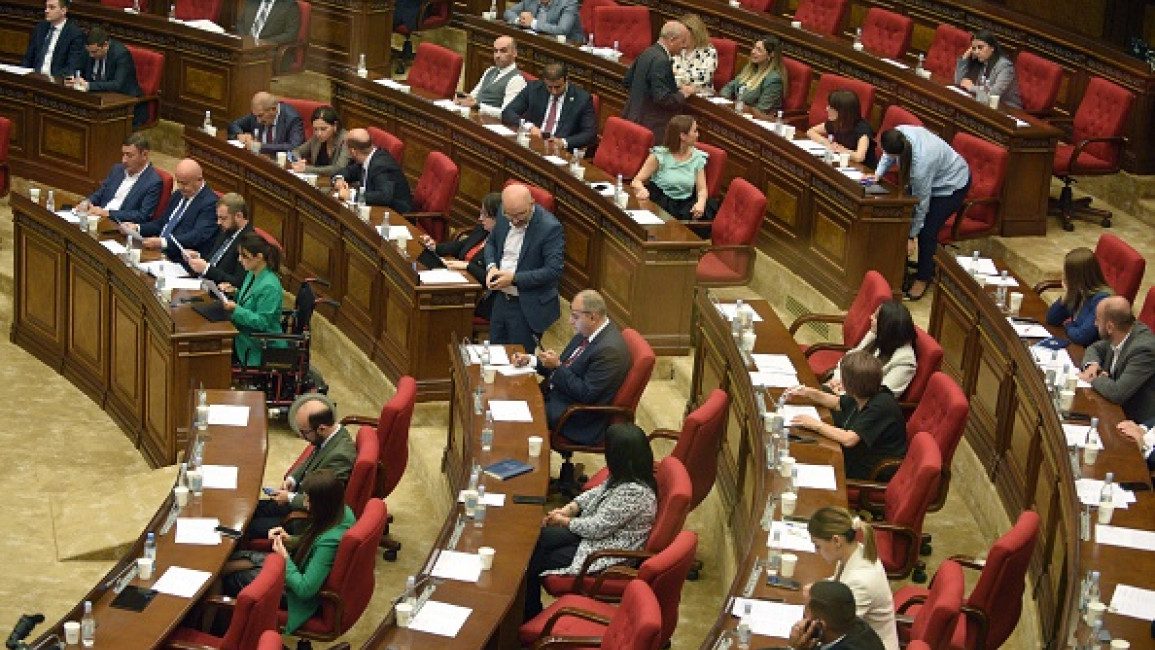World
Russia is displeased because Armenia ratified the ICC founding treaty

On Tuesday, Armenian parliament approved a crucial step towards joining the ICC, a decision that was predicted to exacerbate relations with Moscow, the ex-Soviet country’s longtime ally.
The Hague-based court issued an arrest warrant for President Vladimir Putin in March due to the conflict in Ukraine and the forcible deportation of children to Russia, and Russia claimed it was “wrong” to ratify the treaty to join that court.
If the Russian president enters their country, ICC participants are anticipated to conduct the arrest.
The vote demonstrated a widening gulf between Moscow and Yerevan, which has become unhappy with Moscow over what it sees as its passivity on Armenia’s protracted conflict with Azerbaijan.
Last month, Azerbaijani forces invaded Nagorno-Karabakh, a breakaway area where Russian peacekeepers are stationed, and forced Armenian separatist forces, which had ruled the mountainous region for decades, to submit.
An online broadcast of the Armenian parliamentary session showed that 60 of the deputies supported the idea, while 22 MPs, mostly from the opposition, voted against it.
“Wrong choice”
The Kremlin attacked Armenia’s choice right away.
Dmitry Peskov, a spokesperson for the Kremlin, told reporters, “We are sceptical that, from the point of view of bilateral ties, Armenia’s admission to the Rome Statute is correct.
He continued, “We still think it was the wrong choice.
The role of Russian peacekeepers in the self-declared republic of Nagorno-Karabakh, which declared its dissolution last week in response to Baku’s quick military campaign, has also been a source of escalating tension between Yerevan and Moscow.
The region is located inside of Azerbaijan’s internationally acknowledged border.
Nikol Pashinyan, the prime minister of Armenia, said last week that the plan was not “directed against” Russia in an effort to allay Kremlin concerns.
It stems from national security concerns, and making such a choice is within our sovereign rights, he said.
Pashinyan has previously called his nation’s security alliance with Moscow “ineffective” and criticised Moscow for declining to intervene during Azerbaijan’s offensive.
“Conditio sine qua non”
The Collective Security Treaty Organisation (CSTO), a security alliance commanded by Moscow, is the only option available to Armenia, the Kremlin reiterated on Tuesday.
The Armenian side doesn’t have any alternatives, according to Peskov.
The vote by the parliament was applauded by Catherine Colonna, the French foreign minister, who was in Yerevan at the time.
She said on X, formerly known as Twitter, that “the fight against impunity for crimes is a condition for peace and stability.”
The decision was centred on the nation’s security concerns, the Armenian delegate for international legal matters informed parliament.
Eghishe Kirakosyan stated, “We are creating additional guarantees for Armenia” in response to Azerbaijan, Armenia’s longtime adversary, posing a threat to its territorial integrity.
It seems to be a reference to May 2021, when Azerbaijani forces invaded a small area of Armenia along their common border.
Concerns
According to Kirakosyan, Yerevan had suggested a bilateral agreement be signed with Moscow to allay Moscow’s worries regarding the ratification of the Rome Statute.
Despite having agreed to the Rome Statute in 1999, Armenia chose not to ratify it because it conflicted with its constitution.
Following Armenia’s ratification of a new constitution in 2015, the constitutional court declared in March that such barriers had been abolished.
Following the September offensive, the majority of Armenians in Karabakh left after its leadership said that the region will be abolished on January 1st, 2024.
The mountainous area, which is primarily inhabited by Armenians who consider it to be a part of their ancestral territory, has been a part of Azerbaijan since the collapse of the Russian Empire.
With the backing of Armenia, it unilaterally declared its independence in 1991, shortly after the Soviet Union had fallen.
In particular, during the first Karabakh conflict from 1988 to 1994 and the second in 2020, insurgents in Karabakh resisted Baku with Yerevan’s assistance.
A settlement mediated by Russia brought an end to the six-week conflict, allowing for the deployment of the 2,000-person peacekeeping force.
The territory’s independence was never acknowledged by the international community.
